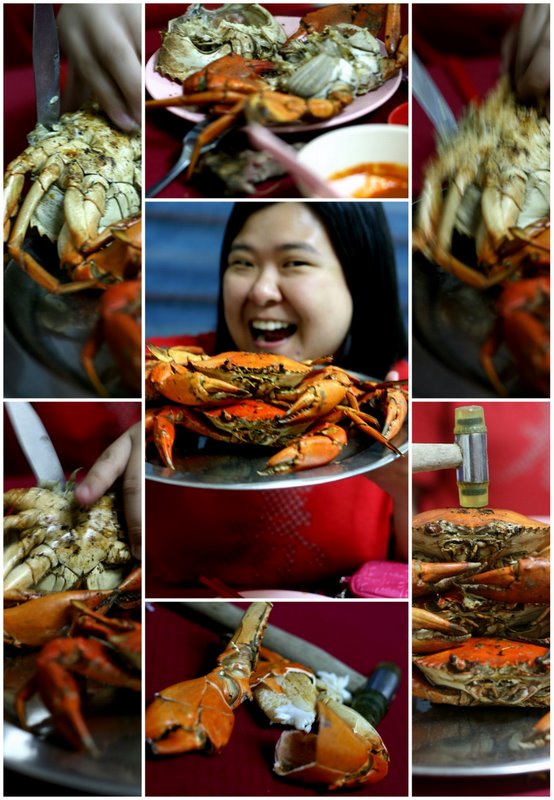
It’s funny how holiday destinations are determined. While we were holidaying in Australia last year, Bald Eagle purchased Ferran Adrià’s book, A Day at El Bulli, lugged all 500 pages and 7lbs of it, covertly, back to Malaysia and presented it to me as a gift on Valentine’s Day this year. It was an incredibly thoughtful gift. What I didn’t realise was that Bald Eagle was also secretly conspiring to get reservations at the much sought-after, world’s best restaurant, El Bulli, a fact which he revealed to me much later in the game.
Unfortunately, when 2 million people are competing for 8,000 places, and despite regular correspondences with the restaurant (at this point, we were on a first name basis with a very possibly frustrated Luis Garcia of El Bulli…hola, Luis!), we did not succeed in getting bookings. And like everybody else who visits Spain and isn’t successful in getting reservations at El Bulli, we started planning our itinerary at locations closest to the next available Michelin rated restaurant. We still wanted to visit Barcelona for the sights, but the other city that we chose was based purely on its culinary offerings.
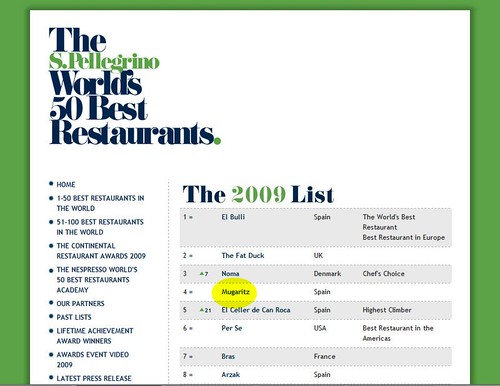
Enter San Sebastian, holy ground and birthplace of Basque high cuisine and city with the highest number of Michelin starred restaurants per square kilometre. We were SPOILT for choice. With the assistance of our friend, Le Cordon Bleu trained chef, Jun, we narrowed down the list to two restaurants – Mugaritz and Arzak. To be honest, I chose Mugaritz over Arzak for two reasons – its ranking on the S.Pellegrino World’s 50 Best Restaurants for 2009 and the uber cool minimalist website. Call me superficial. Upon further research, I learnt that Chef Andoni Luis Aduriz at Mugaritz was a protégé of Adriá and had also trained under Martin Berasategui and Juan Mari Arzak, which was almost like divine providence (re Adriá) and assurance that I had made the right decision.

Getting to Mugaritz from San Sebastian isn’t easy as it is quite literally in the middle of nowhere. The restaurant provides detailed directions, but perhaps not precise enough as a number still lose their way. It is a mere 30 minutes or less to the destination, hardly anything in relation to time spent in our KL traffic, but we didn’t want to risk losing our way so we hailed a cab – 20 Euros was a fair price to pay to eliminate potential arguments along the way (you said turn left at the 4th bush, no I said turn right 60 degrees from the 5th puddle!).


The farmhouse which the restaurant occupies is lovely, a perfect foil for the sunshine that streamed in so generously that day through the large glass windows into the expansive dining room.
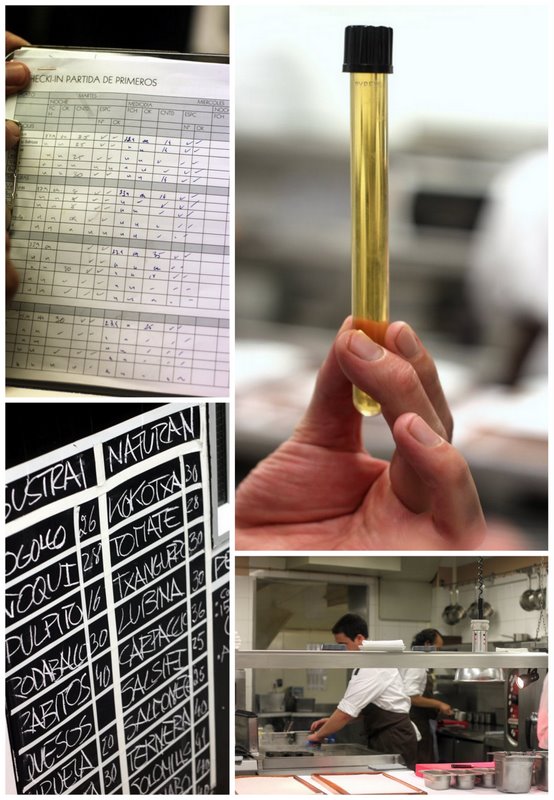
We were delighted when the affable Maître d’ led us to the kitchen for a quick tour, a rather brilliant touch to the overall dining experience, and reassuring if I may add, knowing that our meals were prepared in a very controlled environment, where sauces were measured into test tubes and temperatures were regulated thus ensuring consistency of preparation and presentation. We also learnt later that the herbs and flower petals in our dishes were all grown in and gathered from their garden.


If you’re looking for just a bite, be warned that an ala carte menu is not available at Mugaritz. There are only two set menus at Mugaritz. In our case (and because we wanted to maximise on our miles to consumption ratio), we chose the more expensive and extensive Naturan menu with 11 dishes. One of the most recognizable of Mugaritz’s dishes is the amuse bouche – potato “rocks”, designed to create a bit of humour whilst maintaining functionality. This was more of a visual treat; after all, potatoes are potatoes are potatoes, aren’t they? Before I get reprimanded by the potato police, I will add that they had a nice creamy texture with a crunchy exterior thanks to its fired ceramic clay covered skin. Other items of amuse bouche included fried prawns that could be eaten whole, and silken smooth squid with alliums (onions, garlic and flowers from the allium family).

Part of the thrill of dining at Mugaritz was the challenge of figuring out what the chef had pulled out of his hat. Some were new to our palate but straightforward, like the silky Kokotxa de Bacalao (literally translated: cod chin) served with an acacia honey emulsion. The texture was what I’d expect a “chin” to taste like, especially when the chin resembled mine – fatty and gelatinous. I sometimes suspect that chefs secretly enjoy teasing their guests. Why else would a description of “roasted tomato salad and its own cool water” and “carpaccio accompanied by a sweet and sour dressing, D.O.Idiazabal cheese and vegetable splinters” sound so innocent, yet mask surprises? The tomato looked shriveled like my grandma, slightly dehydrated, but yet retaining its sweetness (unlike my grandma), and the icy granita beside it numbed my mouth with its coldness and exploded with the cool taste of tomatoes. A ravioli filling of crab and fresh walnuts followed this dish where a clear citrus scented consomme, very delicate in flavour, was brought separately and poured onto the ravioli.

The seabass was served on a bed of grilled zucchini seeds. I love the use of the allium flower to add a light pungent perfume to the dish.

The pièce de résistance which succeeded in confounding us was the carpaccio. “It’s not meat,” winked José Ramón, the cheeky Maître d’. Convention + logic made me conclude that the carpaccio was red pepper while Bald Eagle still insisted it was meat, but in reality it was watermelon cooked for 12 hours, then frozen and thawed 3 times, and then taken out and sliced thinly to resemble “carpaccio”, deseeded, smoked and served. The texture was certainly very much like meat.

Fossilized salsify with briny roe and sea accents
If you’ve ever tried eating a twig, this is it. Seriously, though, the fossilized salsify is a tuber that has been, well, fossilized. In this dish, the salsify was soaked in water with calcium added to it, and then cooked, resulting in a fossilized appearance on the outside. The whole dish exuded a whiff of the sea. The green seaweed-like thing was apparently harvested from a point between the river and the sea.
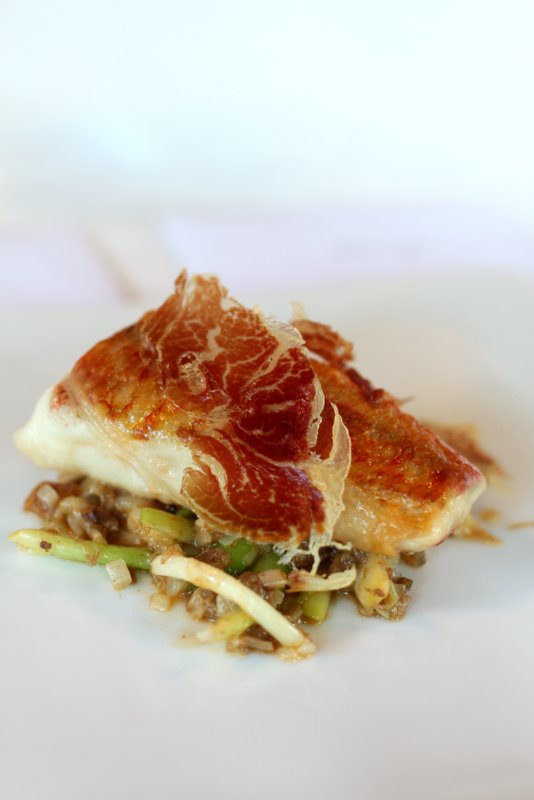
Sauteed red mullet fillets served over a vegetable and liver stew
The mullet was ingeniously halved, deboned, then reassembled together with an equivalent of Italian “lardo”. The liver in the dish was from the mullet, and in order to use it, the fish had to be super fresh. The iberico ham added flavour to a relatively bland type of fish.

Milk fed veal, roasted and perfumed with vine cutting embers and fragments of thyme, cinders, salt and crisp radishes
The meat that we had came from a 180kg 4 month old milk fed calf. Thanks to the special diet, the meat was pale and slightly pinkish and the flavour subtle. The black exterior was a result of marinating the meat in black ink made from vegetables. The meat was cooked rare on a coal fire, thus sealing in the juices and allowing us to fully appreciate its flavour.

Loin of duck, served with iodized compliments, crumblings and shavings of summer truffle
When we first glanced at this dish, the immediate thought was – they must have HUGE ducks in Spain, only to be informed later that several pieces of duck loins were joined together to form one piece. Summer truffles were not in season, and its sole purpose there was to offer a bit of texture, and slight flavour, to the dish.

Several spoonfuls of clashing contrasts – heavy cream, sweets and leaves, and warm artisan tablet with whipped honey and oats
The dining experience at Mugaritz was a glorious assault on the senses. Our first dessert resembled a food bouquet. Eleven different flowers and herbs were used to create this dessert, and the herb ice cream, which contained no sugar, derived all its sweetness from celery root. The second dessert was a perfect ending to the meal. The child within was summoned as pretty bubbles made of honey sat playfully in a bowl, created with a fish tank bubbler and held together by xanthan gum.
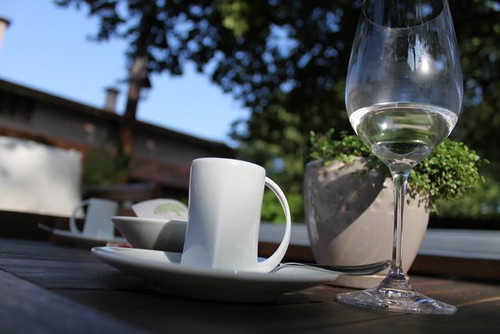
The weather was beautiful enough to have coffee in the garden. When one has just arrived from the sahara, sitting outdoors in aircond temperature with the warm sun on the skin is a wonderful feeling. It didn’t go down well with my facialist, though. In her words, “Aiyoh, Meena, you’ve become BLACK!”. Some people have no appreciation for a nice tan. I’ve decided to ignore my pigmentation.
The question you’d probably ask me is this – was it worth it? (And I’m assuming you know that I’m referring to the meal and not my damaged skin.) The food, as you can see above, was amazing. Putting aside the scientific genius employed in the preparation of the food (which definitely deserves bonus points), I let my senses decide – taste, smell, touch….every aspect was put to the test, and yes, I was impressed at the way the flavours came through. As for service, I have incredible respect for José Ramón, the multilingual Maître d’. He held the fort well, gliding from table to table to hold discussions, tease, tantalize and challenge everyone with his own brand of humour. The sommeliers did a wonderful job in recommending wines to us. The waiters rotated; a dedicated waiter would have been better, but José Ramón’s constant appearance made up for the deficiency in that area. The ambience was very zen-like – stark, quiet, peaceful. One would expect a 2 star Michelin rated restaurant to have a formal dining atmosphere, but to us, it was an invitation to relax rather than to be stiff. We slouched, moved about, spoke amicably with the neighbouring tables, laughed…it felt great. Mugaritz’s invitation to submit is this….150 minutes to feel, imagine, reminisce, discover. 150 minutes to contemplate. So the question one has to ask one’s self is this: How much would I be willing to pay for a dining experience where so many different emotions are evoked as a result of the above factors?
www.mugaritz.com
